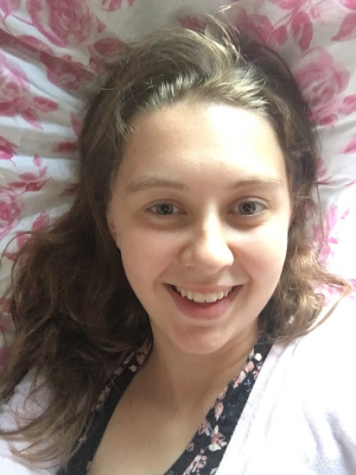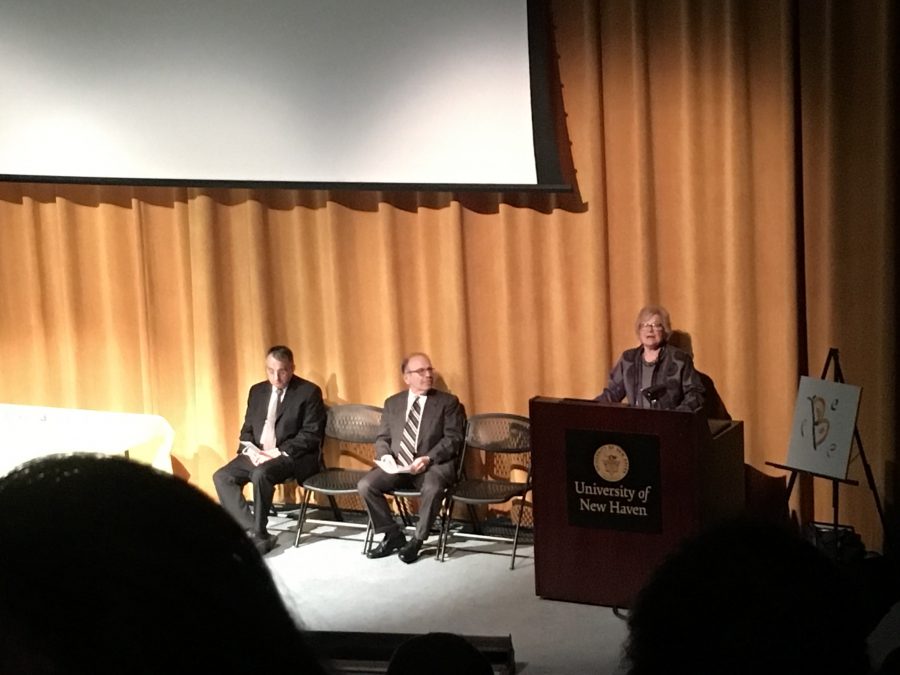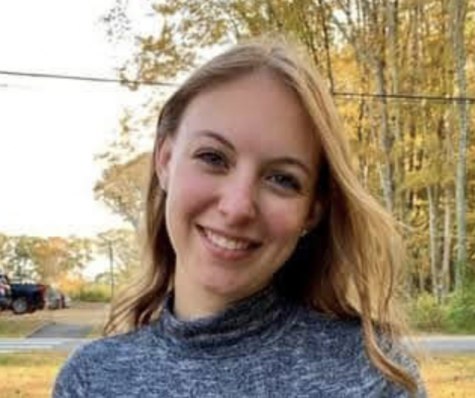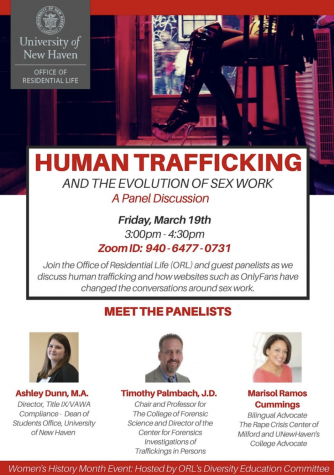Holocaust Survivor Tells Her Story to UNH
On April 19, 2017, several University students, faculty and friends gathered for the 14th Annual Order of Service for Holocaust Remembrance Day at Bucknall Theater. Crowds, young and old, came together for a time of remembrance and reflection of those who were lost to dark times of the Nazi Party and the genocide of over 6 million Jews, in addition to the millions of homosexuals, handicapped people, gypsies, and others who did not fit the Nazi Party’s criteria. The service was a dedication to the Jews who had been persecuted and killed, as well as a reflection on those who had survived and are still here.
University Provost, Daniel May started the memorial off with introductions. They highlighted the importance of teaching others what several millions of innocents went through during Hitler’s regime, and how people can use what they learn “to make every effort to cultivate the tolerance and understanding that should be the hallmark of a humanity, even when preoccupied with our ordinary studies, and day to day activities.”
May gave a heartfelt review over the events of history, how it cost so many people their lives, and how today was a time to remember all those who were killed. The hope was that ceremony would inspire people to appreciate one another with respect and ignore labels or belief in supremacy.
The ceremony transitioned Ira Kleinfield and the lighting of candles. This was in keeping with the Jewish tradition of remembering and immortalizing what Holocaust Remembrance Day.
“It is our custom to light 8 candles,” explained Kleinfield, “one for each of the million Jews who were slaughtered, making 6 in number. One in great commission for all the other groups who were killed as well, such as Jehovah’s witnesses, gays and lesbians, and the mentally handicapped. And the eighth in recognition those righteous individuals who stepped forward to give comfort at great personal risk of themselves and to their families.”
Additionally, there was a ninth candle in honor of Herman Sheppard, a survivor who was the keynote speaker in 2014, who sadly passed away last month.
The students also contributed to the presentation through their creativity and words. Members of the University of New Haven theater department did a special performance in memory of Pavel Friedman, a Czechoslovakian boy who was killed in a concentration camp, and wrote the poem The Butterfly that was found after liberation. The theatre group recited the beautiful poem while painting, revealing a beautiful butterfly representing the one that Pavel missed during his time in the camp. The theatre group explained that they had assisted with the presentation the previous year, and felt compelled to be a part of it once again. One member explained that she is of Jewish heritage, and the entire day in extremely important to her.
The highlight of the memorial was the keynote speaker, Ruth Fishman, a survivor of the Westerbork and Theresienstadt concentration camps. She was rare case in that she was one of one hundred children out of 15 thousand who were sent to Theresienstadt, and also one of the extremely rare cases where most of her family, her brother, parents, and one set of grandparents, survived together through it all. Ruth was able to recount many details of what had happened to her, and had a unique perspective since she was a child.
She compared her memory to “a movie you have seen many, many years ago, and you’ll see certain images quite sharp and real . . . certain things are reinforced by sharing a talking to others.”
Ruth chronicled her story of survival and horror to the audience, starting with her home. She was born Ruth Lichtenstern in Cologne, Germany in 1935, but had to move to Amsterdam when she was only one year old. While her family avoided the Nazi party for a while, the invasion of the Nazi party put her family in danger. Little by little, she was limited, banned, and held up by the Germans for being a Jew, although her family was able to avoid being deported because her father worked in the metal industry. Unfortunately, they were eventually forced to move to an Amsterdam theater and sent to Westerbork Concentration Camp, a transit camp ready to deport Jews to their death. All while this was happening, little Ruth thought that this was all normal and a part of life.
Ruth’s family were fortunate enough to be in a one room cabin at the camp instead of a barrack due a Paraguayan passport that was smuggled to them from a friend in Switzerland. Her father started a metal operation with several men to separate metal and delay the deportation of Jews to Auschwitz. Her father and mother worked, and she and her brother preoccupied themselves with other children. Life was not wholly bad at the camp for Ruth, and her family was able to stay together with modest living conditions. She was given responsibility of guarding a small doll from her father that contained money and other small items hidden in the head; all of the family’s savings needed for emergencies were in her hands.
A little over a year later, Ruth and her family were deported to Theresienstadt, and subjected to the camps terrible conditions. Sickness, starvation and being overworked made things harder for her and the prisoners. She lost her maternal grandparents to Auschwitz, and nearly her father. However, he was saved by the Paraguayan passport, and it helped keep her family together. The Nazis began to build gas chambers outside the camp, prepared to kill all of the prisoners within months, until they were liberated by Soviet Troops on May 9, 1945.
After relocated with her father’s metal business during the Korean War, Ruth attended American school and moved to the United States when she was 18. She now lives in West Hartford and has a family of her own with three children and seven grandchildren.
Ruth said that she started sharing her story “at her grandson’s class. My daughter-in-law asked me to. . . but did not tell me it was in front of the entire school.” She continues to share her story as “many people from those times have passed away. The younger generation must be the ones to tell the story and keep history preserved.”
After Ruth finished her story, the ceremony held a tribute to Hiram Bingham IV. Hiram was responsible for helping over 2,500 Jews from escaping the advancing Nazi forces in France. He spent his time creating fake passports to allow them to leave, at the eventual cost of his successful political career, and was honored for what he had done posthumously.
Several members of the University and Jewish community came together to read the names of all the victims related to the families of the New Haven communities. 87 family and friends were remembered for losing their lives to the Holocaust, and would not be forgotten for a long time. The afternoon ended with a moment of silence and contemplation over what the events, as well as a beautiful memorial blessing and chant by Rabbi Andrew Hechtman.

Sarah is a junior studying Dental Hygiene. She is often writes for Opinions, Student Life, and Entertainment. Sarah has started writing for Charger Bulletin...











